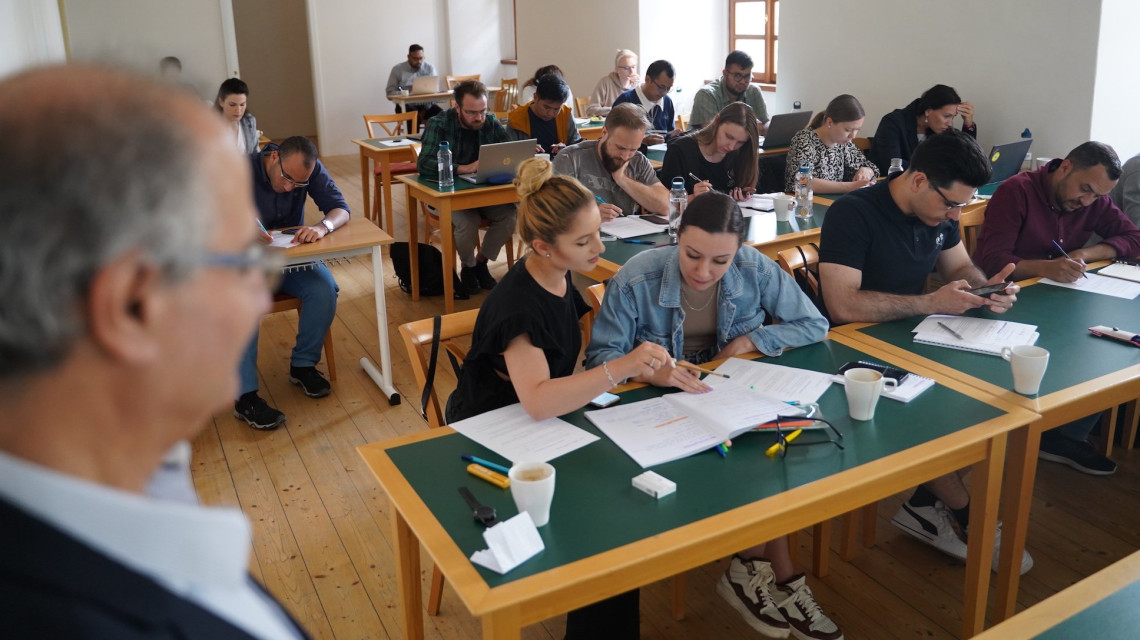Following close to a month of hands-on training, technical site visits and theoretic lectures spread across two continents and three countries, IAEA and international experts presided over the graduation of 23 young professionals from 16 countries, whose expertise in nuclear power management and related areas has now been certified by the Intercontinental Nuclear Institute (INI).
For the last decade, the development of a sustainable workforce has been a priority for the nuclear power sector. Among newcomer countries, the challenge lies in establishing an academic pipeline and building professional networks; and in countries with a long tradition of nuclear power generation, ageing workforces and ongoing retirements present a growing threat.
The Intercontinental Nuclear Institute responds to these sector-wide challenges by bringing together an international cadre of young nuclear power professionals-including engineers, energy and power grid planners, lawyers, and reactor operators-to engage in an intensive four-week training programme.

This year's session of the Intercontinental Nuclear Institute was attended by 23 young professionals, representing all four technical cooperation regions. (Photo: INI)
"Understanding how nuclear power plants (NPPs) function, not only in theory but also in practice, is perhaps the most important thing I can bring back to my country following my participation in INI," said Kevin Alvanez Umaña, a course participant and an Energy Planner and Analyst in El Salvador's Directorate of Energy, Hydrocarbons and Mines. "Moreover, by meeting nuclear professionals from other countries, facing different challenges, I can transmit the lessons they learned to my colleagues."
The INI programme is supported through the IAEA technical cooperation programme[1], with funding from the Peaceful Uses Initiative, and through a joint initiative between the U.S.-Czech Civil Nuclear Cooperation Centre (CNCC) in Prague and the University of Massachusetts at Lowell (UML).
"My country, Ghana, is planning to add nuclear energy to its energy mix and, by 2030, we will start running our first nuclear power plant," explained Ethna Adzokpa, an INI 2023 course participant and a nuclear engineering student at the University of Ghana. "I hope to share the new knowledge acquired here in order to make a significant contribution to the Ghana Nuclear Power Programme."
In addition to implementing the course's traditional itinerary-which includes NPP site visits hosted by the Czech Technical University (CTU), through NuclearHub Prague and the University of Massachusetts (UML) in Lowell-this year, the INI programme has been expanded to include human resources development and nuclear knowledge management topics, as well as a visit to the IAEA's headquarters in Vienna and the Zwentendorf nuclear power plant in Austria.

INI's four-week curriculum provides both theoretic lectures and practical guidance related to nuclear power production, to give students the best possible foundation for their continuing nuclear careers. (Photo: INI)
"The INI program participants are among the best and the brightest, representing geographical, nuclear energy jobs and gender diversity," said Radek Skoda, a Professor at the Czech Technical University in Prague and one of two INI Co-Directors.
The training course supports Member States in the development of both long-term national nuclear energy strategies and more sustainable nuclear energy infrastructure, based on the highest levels of safety and security, all while simultaneously meeting long-term energy needs.
During the third week of the programme, INI participants travelled from Czechia to the United States, where they visited the Harvard Belfer Centre, the University of Massachusetts open-pool Research Reactor and the MIT Test Reactor. They also attended lectures and inspections tours, and finally developed group projects designed to reflect their new understanding of NPP management dynamics. Fellows also participated in several hands-on exercises in radiochemistry, radiation dosimetry, nuclear security and safeguards during the four-week program.
"This year, for the first time, the number of women participants was greater than men, we are happy to see that gender balance among our cohorts," explained Professor Sukesh Aghara, INI Co-Director.
This year's session of the Intercontinental Nuclear Institute benefitted from the attendance of students from Armenia, Bulgaria, Czech Republic, Egypt, El Salvador, Estonia, Ghana, Hungary, Indonesia, Jordan, Phillippines, Poland, Romania, Slovakia, Türkiye and Ukraine.
[1] RER2017. 'Assessing the Role of Low Carbon Energy Technologies for Climate Change Mitigation"






